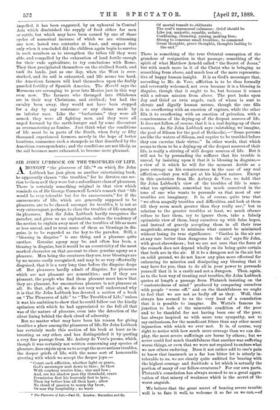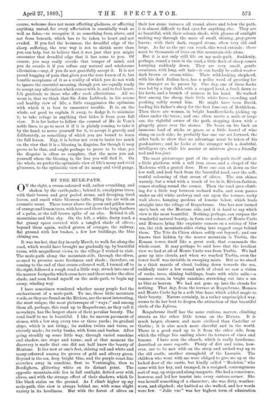A SIR JOHN LUBBOCK ON THE TROUBLES OF LIFE. MONGST "the
pleasures of life,"* on which Sir John Lubbock has just given us another entertaining book, he apparently classes "the troubles," for he devotes one sec-
tion to them as if they were but a subordinate class of pleasures. There is certainly something original in that view which reminds us of Sir George Cornewall Lewis's remark that "life would be very tolerable but for its amusements," for if the amusements of life, which are generally supposed to be pleasures, are to be classed amongst its troubles, it is not so very extravagant, perhaps, to class the troubles of life amongst its pleasures. But Sir John Lubbock hardly recognises the paradox, and gives us no explanation, unless the tendency of the section to explain away most of the troubles of life as more or less unreal, and to treat some of them as blessings in dis- guise, is to be regarded as the key to the paradox. Still, a " blessing in disguise " is one thing, and a pleasure quite another. Genuine agony may be, and often has been, a blessing in disguise, but it would be an eccentricity of the most marked character on that account to class genuine agony as a pleasure. Men being the creatures they are, true blessings are by no means easily recognised, and may be so very effectually disguised, that it is a very long time before the disguise drops off. But pleasures hardly admit of disguise, for pleasures which are not pleasant are nonentities ; and if they are pleasant, the people who find them pleasant must know that they are pleasant, for unconscious pleasure is not pleasure at all. So that, after all, we do not very well understand why it is that Sir John Lubbock has devoted a section of a book on " The Pleasures of Life" to " The Troubles of Life," unless it was his ambition to show that he could follow out the kindly optimism with which he had appreciated to the full all that was of the nature of pleasure, even into the detection of the silver lining behind the dark cloud of adversity.
But no matter what may have been his reason for giving troubles a place among the pleasures of life, Sir John Lubbock has certainly made this section of his book at least as in- teresting as any other, and has distinguished it by quoting a very fine passage from Mr. Aubrey de Vere's poems, which, though it was certainly not written concerning any species of pleasure, does enjoinupon us to accept the more serious troubles, the deeper griefs of life, with the same sort of honourable greeting with which we accept the deeper joys :—
" Count each affliction, whether light or grave, God's messenger sent down to thee; do thou With courtesy receive him ; rise and bow ; And, ere his shadow pass thy threshold, crave Permission first his heavenly feet to lave ; Then lay before him all thou haat ; allow No cloud of passion to usurp thy brow, Or mar thy hospitality ; no wave • The Fkasuves of Life.—Part II. London : Macmillan and Co.
Of mortal tumult to obliterate The soul's marmoreal calmness : Grief should be Like joy, majestic, equable, sedate ;
Confirming, cleansing, raising, making free;
Strong to consume small troubles ; to commend Great thoughts, grave thoughts, thoughts lasting to the end.'
There is something of the true Oriental conception of the grandeur of resignation in that passage; something of the spirit of what Matthew Arnold called " the Secret of Jesus," but with much more in it of the Christ who is bringing us
something from above, and much less of the mere representa- tive of happy human insight. It is as God's messenger that, according to Mr. de Vere, affliction is to be thus formally and reverently welcomed, not even because it is a blessing in disguise, though that it ought to be, but because it comes with a solemn mission from above. The poet looks upon Joy and Grief as twin angels, each of whom is sent to elevate and dignify human nature, though the one fills it to overflowing with an emotion of rapture, while the other fills it to overflowing with an emotion of privation, with a consciousness of the drying-up of the deepest sources of life. It does not follow, of course, that it is a real drying-up of these sources. As Sir John Lubbock says (mistaking, we imagine, the pool of Siloam for the pool of Bethesda),—" Some persons are like the waters of Siloam, and require to be troubled before they can exercise their virtue." In other words, that which seems to them to be a drying-up of the deepest sources of their life, is really a stirring of still deeper sources of life. But it will not be by persuading the sufferer that his trouble is unreal, by insisting upon it that it is blessing in disguise,— a view of it which he will for the moment deride as a pure outrage on his consciousness in the case of any real affliction,—that you will get at his highest nature. Except in this quotation from Mr. Aubrey de Vere, we hold that Sir John Lubbock's view of the troubles of life is some- what too optimistic, somewhat too much conceived in the tone of one who wants to persuade us that most of our troubles are imaginary. It is, of course, quite true that " we often magnify troubles and difficulties, and look at them till they seem much greater than they really are ;" but in relation to the greater troubles at least, we much oftener refuse to face them, try to ignore them, take a falsely optimistic view of them, buoy ourselves up with false hopes, and instead of gravely accepting them in all their true magnitude, attempt to minimise what cannot be minimised without losing its true significance. " Castles in the air are at any rate better than dungeons in the air," says Sir John, with great shrewdness ; but we are not sure that the force of the remark does not depend wholly on its being quite certain
that both are in the air. If it be a dungeon not in the air but on solid ground, we do not know any plan more effectual for
enhancing its miseries and dissipating any blessing that it may have for you, than to do all in your power to persuade yourself that it is a castle and not a dungeon. Then, again, as to the best way of treating real troubles, Sir John Lubbock quotes at length a passage from Plutarch insisting on the " contentedness of mind " produced by comparing ourselves with people " worse off," and on the thankfulness we ought to feel that we are not as badly off as they. Well, that always has seemed to us the very least of a consolation that it is possible to imagine. Dr. Watts's famous in- junction to look at the miserable condition of the poor and to be thankful for not having been one of the poor, has always inspired us with more true sympathy, not to say enthusiasm, for the mendicant friars than any other moral injunction with which we ever met. It is, of course, very right to notice with how much more courage than we can dis- play, the most severe suffering's are borne by others ; but we never could feel much thankfulness that another was suffering worse things, or even that we were not required to endure what we saw others enduring. Does it not rather add to one's pain to know that inasmuch as a far less bitter lot is utterly in- tolerable to us, we are clearly quite unfitted for bearing with the highest courage and fortitude a lot which is actually the portion of many of our fellow-creatures ? For our own parts, Plutarch's consolation has always seemed to us a great aggra- vation of that misery of weakness which is the secret of the worst anguish.
We believe that the great secret of bearing severe trouble well is to face it well, to welcome it so far as we can,—of
course, welcome does not mean affecting gladness, or affecting 'anything unreal, for every affectation is essentially weak as well as false,—to recognise it as something from above, and not from beneath, which has to be taken to heart and not evaded. If you feel the keenness, the dreadful edge of the sharp suffering, the true way is not to shrink more than you can help, but to believe that it was just that you might -encounter that dreadful edge that it has come to you. Of course, you may easily overdo that temper of mind, and you do overdo it if you refuse any natural and wholesome alleviation,—nay, if you do not gratefully accept it. It is not proud hugging of pain that gives you the true lesson of it, but humble acceptance of it as a reality of which you do not wish to ignore the essential meaning, though you are equally ready to accept any alleviation which comes with it, and to feel heart- felt gratitude to those who offer such alleviations. All we mean is, that we think that Sir John Lubbock, in his serene and healthy view of life, a little exaggerates the optimism with which it is best to encounter trouble. It is, on the whole, not good to explain it away, to dodge it, to minimise it, to take refuge in anything that hides it from your full view. It is far better to follow the counsel of Mr. de Vere's noble lines, to go to meet it if it is plainly coming, to take it by the hand, to nerve yourself for it, to accept it gravely and deliberately, as something of which you are bound to learn the full lesson. Nay, it is better not even to insist too much on the view that it is a blessing in disguise, for though it may prove to be that, and ought perhaps to prove to be that, yet the disguise is often so complete, that the more you ask yourself where the blessing is, the less you will find it. On the whole, we prefer the optimistic view of life's many and vivid pleasures, to the optimistic view of its many and vivid pangs.



































 Previous page
Previous page